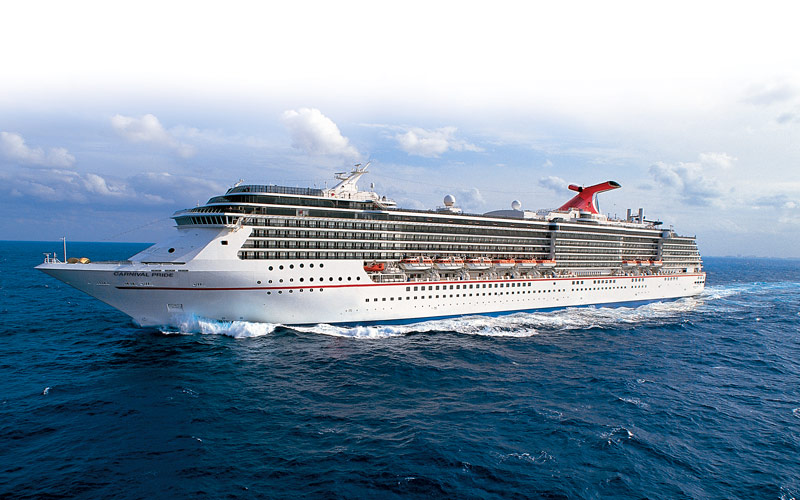 Carnival Pride | Courtesy of The Cruise Web Carnival Pride | Courtesy of The Cruise Web by Madeline Merrill This past winter break, my family and I left port from Baltimore, Maryland the day immediately following Christmas. We wound our way through the Atlantic Ocean aboard the Carnival Pride to Grand Turk, Half Moon Cay, and Freeport, Bahamas for some much-needed time away from school and work. While aboard the Carnival cruise line, we encountered many a crew member who hailed from the Philippines, Russia, Peru, or Indonesia – countries with average GDPs significantly lower than that of America’s. I can recall meeting only two American employees among the Carnival Pride crewmembers. The cruise line industry employs approximately 200,000 individuals worldwide.[1] Typically, there is one crew member for every three to four passengers on board each commercial ship. The hours can be long, and a worker’s ability to ‘get away’ from work is extremely limited, if not impossible, while aboard the cruise line. But cruise lines can justify their low pay to their workers in our global economy, as the income of staff members is often notably higher than salaries available in employees’ home countries. The International Transport Workers’ Federation “represents seafarers on bodies such as the International Maritime Organisation (IMO) and the International Labour Organisation (ILO), which set these global standards for employment conditions, recruitment, training and safety at sea.” [2] These are international authorities that dictate regulations for the working conditions for employees, as well as safety regulations. But although cruise lines do abide by some international maritime standards, the employee pay and working conditions fall well below American labor standards, and the International Maritime Organization does not have the authority to enforce its own rules. Major companies like Carnival and Royal Caribbean are incorporated into foreign countries’ GDPs, like Panama, the Bahamas, Bermuda, and Liberia. By proudly flying the flag of these nations on their ships – and not that of the United States – these corporations are able to avoid United States’ federal taxes, labor laws, and safety regulations. [3] Cruise Lines International Association represents 26 cruise lines, and publicly shared that, in 2011, three-quarters of the nearly 16 million cruise bookings worldwide were made from the United States. [4] Although it is Americans who are enjoying the vast majority of Caribbean getaways at lower prices, a maid aboard a Royal Caribbean ship, for example, may work 12 hours a day, seven days a week, for as little as $156.25 a week with no tips. U.S. labor laws are not applicable to provide protection to crew members at sea, nor is there any real oversight of the cruise lines' operations [5]. Safety precautions are a pressing concern for guests and crew members alike. Ross Klein, a cruise expert and author, shares that “fires broke out in 79 cruise ships from 1990 to 2011. Most of these fires received little coverage in the U.S. press. It is a topic that the travel publications avoid and travel agents do not like to hear,” contrasting against their colorful advertisements of cruising as a fun, safe family vacation.[6] The cruise industry provides once-in-a-lifetime memories for American families at relatively discounted prices, but at what social cost to employees? At what safety risk? Americans - my family included - might want to think twice before booking an all-inclusive cruise down south. Safety concerns, low pay, and tax evasion are just a few reasons why Carnival and Royal Caribbean stay ‘afloat’ financially. But we as consumers need to be diligent in our demands for fair wages for workers and the safest ships possible. [1] http://www.itfseafarers.org/ITI-cruise.cfm [2] http://www.itfseafarers.org/ITI-cruise.cfm [3] http://www.cnn.com/2013/02/13/opinion/walker-cruise-ships/ [4] http://www.cnn.com/2013/02/13/opinion/walker-cruise-ships/ [5] http://www.cnn.com/2013/02/13/opinion/walker-cruise-ships/ [6] http://www.cnn.com/2013/02/13/opinion/walker-cruise-ships/
1 Comment
2/25/2017 05:13:59 pm
Bravo! Shared it here:
Reply
Your comment will be posted after it is approved.
Leave a Reply. |
Categories
All
Archives
April 2022
|
ADDRESSVirginia Policy Review
235 McCormick Rd. Charlottesville, VA 22904 |
|
|